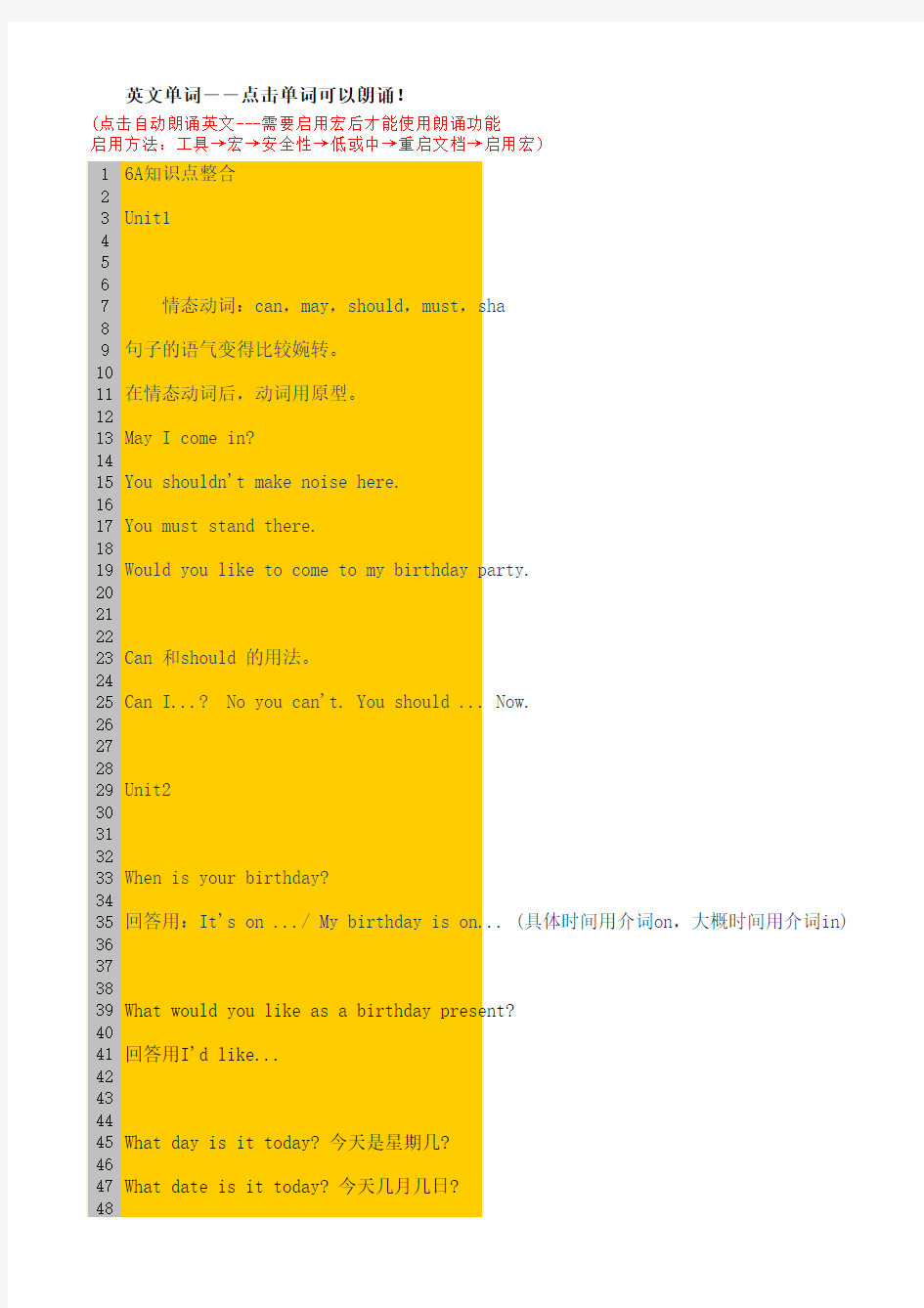

英文单词--点击单词可以朗诵!
(点击自动朗诵英文---需要启用宏后才能使用朗诵功能
启用方法:工具→宏→安全性→低或中→重启文档→启用宏)
16A知识点整合
2
3Unit1
4
5
6
7 情态动词:can,may,should,must,sha
8
9句子的语气变得比较婉转。
10
11在情态动词后,动词用原型。
12
13May I come in?
14
15You shouldn't make noise here.
16
17You must stand there.
18
19Would you like to come to my birthday party.
20
21
22
23Can 和should 的用法。
24
25Can I...? No you can't. You should ... Now.
26
27
28
29Unit2
30
31
32
33When is your birthday?
34
35回答用:It's on .../ My birthday is on... (具体时间用介词on,大概时间用介词in) 36
37
38
39What would you like as a birthday present?
40
41回答用I'd like...
42
43
44
45What day is it today? 今天是星期几?
46
50
51当你对别人有某个建议或询问别人是否愿意做某事时,可以用:Would you like...
52
53
54
55Unit3
56
57
58
59Where is my / your...?
60
61回答用It's on / in / near / behind / under the ...
62
63Where are my / your...? They're....
64
65
66
67一般过去时
68
69表示过去某个时间发生的动作或存在的状态,常和表示过去的时间状语连用,如yesterday,last 70
71night,a moment ago,just now。也表示过去经常或反复发生的动作,常和often,always等表示频72
73的时间状语连用。
74
75一般过去时中,动词要变成它所对应的过去式。
76
771). be动词:am - was,is - was,are - were
78
792). 行为动词变化规律:一般情况下,直接在单词后加 - ed
80
81 单词是以e结尾的,直接加 - d
82
83 以元音字母+辅音字母结尾的,双写辅音字母,再加 - ed
84
85 以辅音字母+y结尾的,去掉y,加 - ied
86
87 (在浊辅音和元音后读/d/,lived,listened
88
89 在清辅音后读/t/,liked,helped,watched
90
91 在/t/,/d/音后读/id/,planted)
92
93一些特殊情况,meet - met,see - saw,go - went,do - did,has / have - had,take - took 94
95
96
97Unit4
98
101...years old ...岁
102
103a lot of 表示很多,一般用来形容可数名词
104
105ask... about ... 问某人关于某事 e.g.I'm asking my mother something about English (现106
107stay away from 远离... know...about 知道某方面的知识 e.g. I know a lot about flowers. 108
109
110
111反义疑问句
112
1131.陈述部分肯定式
114
115#NAME?
116
1172.陈述部分否定式
118
119#NAME?
120
121Can you read the English now?
122
123Can't you read the English now, can you? --- 语气更强烈
124
125They work hard, don’t they?
126
127
128
129Unit5
130
131
132
133What (else) did you do...? (过去某个时间做了什么)
134
135过去时
136
137
138
139Unit6
140
141
142
143not only... but also... 不但... 而且...
144
145e.g. She not only plays well, but also writes music.
146
147What do people do usually at...?
148
149表示节日的词前,用介词at
151过去时的一般疑问句形式
152
153Did you watch TV yesterday?
154
155Yes, I did./ No, I didn't.
156
157
158
159Unit7
160
161
162
163Whose...is it / are they? (询问某件东西的归属)
164
165It's / There’re mine / yours / his / hers / ours.
166
167Unit8
168
169
170
171 Today is the first day of school after the holiday.
172
173the first day of … ……的第一天
174
175e.g. Were there any fruit trees on the farm? (过去一般疑问句)
176
177(there be 句型中经常出现 some / any,肯定句中用“some”表示“一些”,疑问句和否定句则用178
179“any”表示“一些”。)
180
181e.g. Was there any apple on the plate?
182
183
184
185want to do sth 要去做某事
186
187
188
189come after 在……之后
190
191e.g. What day comes after Monday?
192
193 What holiday comes after Mid-Autumn Festival?
194
195
196
197What’s your favourite …?
198
199
200
I’ve got two presents from mum and dad. have got 得到 from 来自
,shall,would。它们所代表是一种情感和态度,使用了它们,
y party.
should ... Now.
day is on... (具体时间用介词on,大概时间用介词in)
hday present?
诵功能,
重启文档→启用宏)
人是否愿意做某事时,可以用:Would you like...
ehind / under the ...
They're....
存在的状态,常和表示过去的时间状语连用,如yesterday,last
。也表示过去经常或反复发生的动作,常和often,always等表示频率
对应的过去式。
s,are - were
况下,直接在单词后加 - ed
e结尾的,直接加 - d
母+辅音字母结尾的,双写辅音字母,再加 - ed
母+y结尾的,去掉y,加 - ied
音和元音后读/d/,lived,listened
音后读/t/,liked,helped,watched
/d/音后读/id/,planted)
- saw,go - went,do - did,has / have - had,take - took,等。
形容可数名词
某事 e.g.I'm asking my mother something about English (现在进行时) ..about 知道某方面的知识 e.g. I know a lot about flowers.
w, can you? --- 语气更强烈
(过去某个时间做了什么)
... 而且...
but also writes music.
(询问某件东西的归属)
/ his / hers / ours.
school after the holiday.
es on the farm? (过去一般疑问句)
/ any,肯定句中用“some”表示“一些”,疑问句和否定句则用he plate?
id-Autumn Festival?
um and dad.